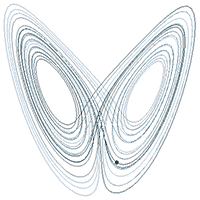Lorenz system (nonfiction): Difference between revisions
Jump to navigation
Jump to search
No edit summary |
|||
| Line 5: | Line 5: | ||
In particular, the Lorenz attractor is a set of chaotic solutions of the Lorenz system which, when plotted, resemble a butterfly or figure eight. | In particular, the Lorenz attractor is a set of chaotic solutions of the Lorenz system which, when plotted, resemble a butterfly or figure eight. | ||
== | == In the News == | ||
<gallery mode="traditional"> | <gallery mode="traditional"> | ||
File:Hamangia-figures-Lorenz-attractor.jpg|link=Hamangia scrying engine|[[Hamangia scrying engine|Hamangia figurines]] computing the Lorenz system. | File:Hamangia-figures-Lorenz-attractor.jpg|link=Hamangia scrying engine|[[Hamangia scrying engine|Hamangia figurines]] computing the Lorenz system. | ||
</gallery> | </gallery> | ||
== Fiction cross-reference == | |||
== Nonfiction cross-reference == | == Nonfiction cross-reference == | ||
Revision as of 10:14, 24 June 2016
The Lorenz system is a system of ordinary differential equation (the Lorenz equations) first studied by Edward Lorenz.
It is notable for having chaotic solutions for certain parameter values and initial conditions.
In particular, the Lorenz attractor is a set of chaotic solutions of the Lorenz system which, when plotted, resemble a butterfly or figure eight.
In the News
Hamangia figurines computing the Lorenz system.
Fiction cross-reference
Nonfiction cross-reference
External links
- Lorenz system @ Wikipedia

